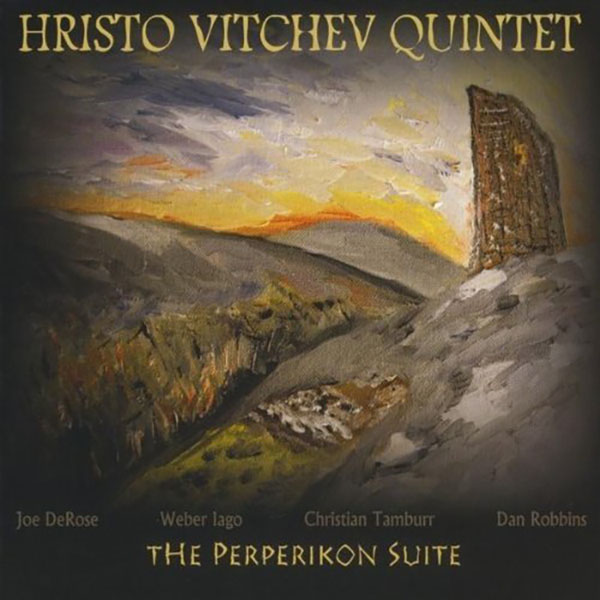
by Ian Mann
May 19, 2011
/ ALBUM
A richly textured album full of strong melodic and rhythmic ideas and with some superb playing throughout.
Hristo Vitchev Quintet
“The Perperikon Suite”
(First Orbit Sounds Music FOSM 51)
Guitarist,composer and educator Hristo Vitchev has been a frequent presence on these pages. Based in San Jose, California, Vitchev has previously released a fine quartet album “Song For Messambria” (2009), collaborated with his regular pianist Weber Iago on a lovely duo recording, “The Secrets Of An Angel” (also 2009), and more recently appeared as a sideman with drummer Joe DeRose’s Amici band (“Sounds for the Soul” 2010).
For “The Perperikon Suite” Vitchev has expanded his band to a quintet with the addition of vibes player Christian Tamburr alongside regular group members Iago, DeRose and bassist Dan Robbins. Vitchev’s playing and writing both owe something to the style of Pat Metheny and the recruitment of Tamburr stirs memories of Metheny’s collaborations with Gary Burton. However, rather like the British Metheny disciple Pete Oxley, Vitchev still brings plenty of himself to the music. In Oxley’s case it’s a certain English whimsy, with Vitchev it’s elements of the folk music of his native Bulgaria. The seven part “Perperikon Suite” is dedicated to the holy city of Perperikon, once the ancient Thracian capital and now part of modern Bulgaria. With Iago also introducing elements of his Brazilian heritage to the band sound this is a richly textured album full of strong melodic and rhythmic ideas and with some superb playing throughout. The music was debuted at the 2010 Monterey Jazz Festival to considerable acclaim and it’s good to see that it has subsequently found it’s way onto disc.
The lengthy opening movement “The Stone Passage” is a good example of Vitchev’s colourful, cinematic writing style building from the shimmering of bells to a fuller, quasi orchestral sound with the leader’s guitar to the forefront. Admittedly many of the adjectives that one would use to describe to Metheny’s music are also applicable here, this music is melodic, episodic, sometimes dramatic and always painstakingly arranged. But for all this it soon becomes clear that Vitchev is an excellent composer in his own right and after a while it’s best to forget the comparisons and just enjoy the music. This opening movement incorporates excellent features for Vitchev, Robbins, Tamburr and Iago but the sense of linear development and a strong narrative arc makes this piece, and the others on the album, far more than just a string of solos.
Movement II “The Palace” exhibits similar melodic qualities and incorporates flowing, lyrical solos from Vitchev, Iago and Tamburr.
De Rose’s distinctive, metallic sounding drum grooves give “The Great Hall” a harder, more contemporary edge but the melodic quality of the music is still there in abundance with exuberant solos coming from Iago and Tamburr. The vibraphonist has a Jarrett-like habit of singing along to his solos which can occasionally be a little distracting. Elsewhere there’s some urgent single note soloing from Vitchev as he and the group really begin to impose themselves on the music.
The following “The Shrine Of Dionysus” retains elements of the group’s new found forcefulness but still finds time for a joyous, highly dexterous solo from bassist Dan Robbins plus slightly more lyrical interludes from Tamburr, Vitchev and Iago.
The fast shuffle of “The Acropolis” adds an element of funk to the proceedings punctuated by solos from Vitchev, Robbins and Iago. The pianist is in particularly sparkling form throughout the track.
“The Northern City” evolves constantly, linked by tricky unison passages underpinned by De Rose’s skittering drum grooves. The busy feel of the piece is interspersed by solos from Robbins, Tamburr, Vitchev and Iago.
The album ends on an elegiac note with “The Southern City” which features the rich, dark timbres of Robbins’ bowed bass, the delicate lyricism of Iago’s piano, Tamburr’s shimmering vibes and the crystalline guitar of the composer.
Vitchev is an unashamedly melodic but very classy writer. As I’ve mentioned before the many fans of Pat Metheny will probably love Vitchev’s music and I’d urge all PMG followers to turn an ear in Vitchev’s direction. Having said that many of the best moments on this album come when Vitchev and his colleagues move away from the Metheny template and give the music a more dynamic and personal focus. The playing by all concerned is superb throughout and for this listener vibes player Christian Tamburr represents an exciting new discovery.
blog comments powered by Disqus